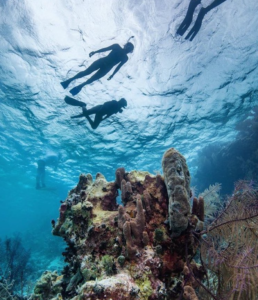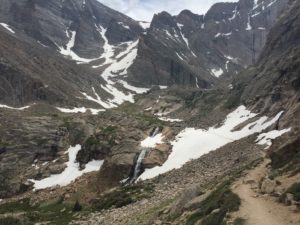LEARNING TO EMBRACE MY IDENTITY OUTDOORS
Learning to embrace my identity outdoors has been a journey.

Posted on Fri 24 Jul 2020 · by Maya Ghosh
Learning to embrace my identity outdoors has been a journey.
When I was seven years old, my father took me on my first overnight camping trip. Between short hikes, he would teach me about different species of flora and fauna, and share quirky facts about the history of whichever National Park we were exploring. And since that trip, I have never looked back.
I have backpacked across the Presidential Range in New Hampshire, scuba dived in many coral reefs and caves, hiked in dozens of National Parks, and sailed great distances. My experience outdoors has been foundational to my childhood and instrumental to my relationship with family and many close friends. But at each one of these intense, rugged adventures, I have always noticed that there was nobody else who looked like me or my family. Unlike the vast majority of outdoorspeople, I am both a person of color and a woman.

Although my family never acknowledged it, our outdoors experiences have been marked by intense code-switching. Growing up, I never thought about how my father would immediately drop his subtle accent when on backpacking trips. My mother, who typically hovers between Indian languages and English, would take the extra effort to ensure that her words would sound like anybody else’s.
However, I will be the first to admit that I have been complicit in the racist expectations for immigrants and people of color. Whenever my mother would slip up in her pronunciation of English words, I would find myself deeply annoyed and a little embarrassed. Whenever we went on adventures with family friends, their choice of Indian snack foods over the traditional trail mixes would make me feel like we weren’t “real” outdoors people.
However, the past few years have been radical for the outdoors community. BIPOC have been reclaiming their space outside and owning their identities. These countless individuals demonstrate that their heritage and culture are assets in the outdoors, and should be celebrated. Their actions expose my own biases and show me that my embarrassment and annoyance have been misplaced.
“I resolve to keep pushing myself towards loving every part of me that has made me feel different or weird outdoors.”
Today, I have nothing but guilt for how I treated my mother and neglected my heritage outdoors. But, because I have come to terms with my identity and become proud of who I am, I feel a renewed sense of hope, responsibility, and excitement.

Now, I want to pay it forward. Over the past few years, I began to recruit my friends who do not fit the typical “outdoorsy” mold to hike, camp, and climb with me. A few years ago, I co-founded an outdoors club to help people plan and tackle their own adventures. I will continue to elevate the voices of BIPOC who spend their lives increasing outdoors accessibility and empowering women of all races and backgrounds.
While my internal work may never be complete, I resolve to keep pushing myself towards loving every part of me that makes me feel different or weird outdoors.
This summer, I hope to work on elevating marginalized voices through AdventurUs Women’s online media and community efforts. I am excited to learn about the incredible women in our community who push themselves and their communities to be better and more accepting of all different kinds of people.
The work to provide accessibility in the outdoors is far from over. As we push the boundaries of what it means to be “outdoorsy,” hopefully we will continue to develop a community of authentic self-expression and identity.